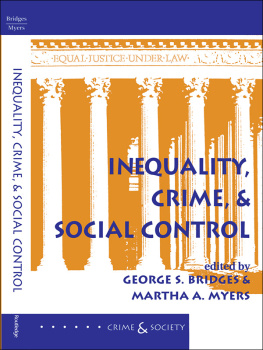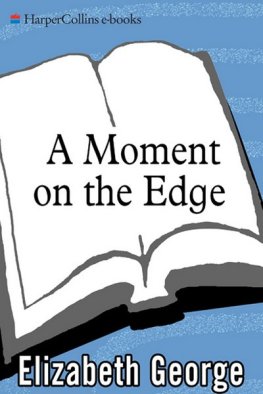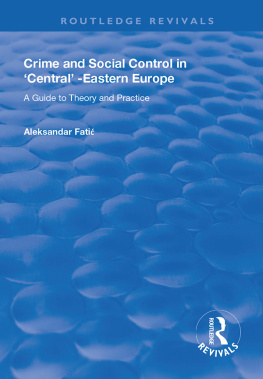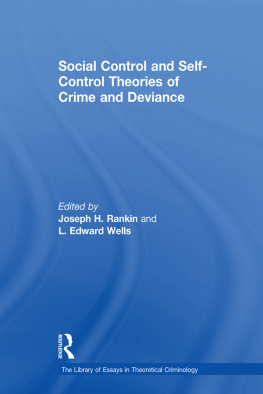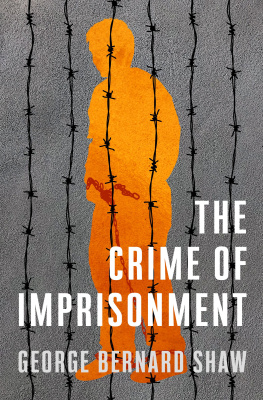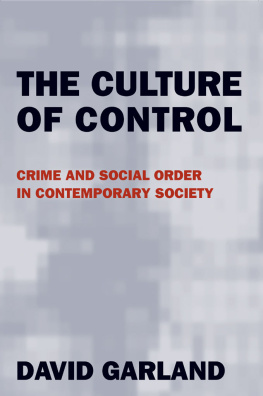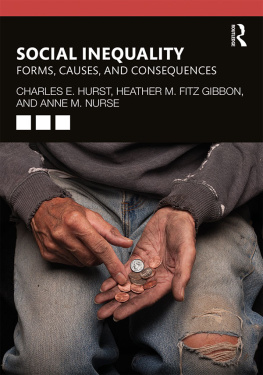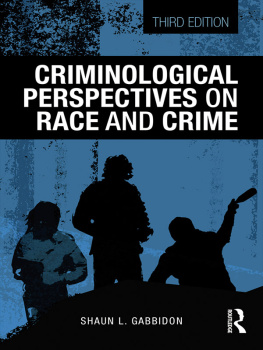Inequality, Crime, and Social Control
CRIME & SOCIETY
Series Editor
John Hagan, University of Toronto
EDITORIAL ADVISORY BOARD
John Braithwaite, Robert J. Bursik,
Kathleen Daly, Malcolm M. Feeley, Jack Katz,
Martha A. Myers, Robert J. Sampson,
and Wesley G. Skogan
Inequality, Crime, and Social Control, edited by George S. Bridges and Martha A. Myers
Alternatives to Imprisonment: Intentions and Reality, Ulla V. Bondeson
FORTHCOMING
Criminological Controversies, John Hagan, A. R. Gillis, and David Brozvnfield
Great Pretenders: A Study of Property Offenders, Neal Shover
Poverty, Ethnicity, and Violent Crime, James F. Short
Crime, Justice, and Public Opinion, Julian Roberts and Loretta Stalens
Crime, Justice, and Revolution in Eastern Europe, Joachim J. Savelsberg
Inequality, Crime, and Social Control
edited by
George S. Bridges and Martha A. Myers
To our mothers,
Helen C. Bridges and
Irene M. Myers
Crime & Society
First published 1994 by Westview Press
Published 2018 by Routledge
711 Third Avenue, New York, NY 10017, USA
2 Park Square, Milton Park, Abingdon, Oxon OX14 4RN
Routledge is an imprint of the Taylor & Francis Group, an informa business
Copyright 1994 Taylor & Francis
All rights reserved. No part of this book may be reprinted or reproduced or utilised in any form or by any electronic, mechanical, or other means, now known or hereafter invented, including photocopying and recording, or in any information storage or retrieval system, without permission in writing from the publishers.
Notice:
Product or corporate names may be trademarks or registered trademarks, and are used only for identification and explanation without intent to infringe.
Inequality, crime, and social control / [edited by] George S. Bridges
and Martha A. Myers.
p.cm.(Crime & society)
Includes bibliographical references and index.
ISBN 0-8133-2004-6 (hard).ISBN 0-8133-2005-4 (pbk.)
1. Social controlCongresses. 2. CrimeCongresses.
3. EqualityCongresses. I. Bridges, George S. II. Myers, Martha
A. III. Series: Crime & society (Boulder, Colo.)
HM291.154 1994
303.3'3dc20 93-38208
CIP
ISBN 13:978-0-8133-2005-2 (pbk)
Contents
George S. Bridges and Martha A. Myers
Charles R. Tittle
Allen E. Liska
Anthony M. Platt
Peter K. Manning
Darnell F. Hawkins
Kathleen Daly
Pat Carlen
James Inverarity
George S. Bridges and Gina Beretta
Stewart E. Tolnay and E. M. Beck
John Hagan and Bill McCarthy
Nicole Hahn Rafter
John R. Sutton
Cassia Spohn
Celesta A. Albonetti
In April 1992, twenty scholars met at the University of Georgia to discuss inequality, crime, and social control in society. Sponsored by the University of Georgia and the American Sociological Association, the meeting was designed to stimulate significant developments in theory and research. This edited volume is a compendium of papers developed from the meeting.
The meeting was held for three days at the Georgia Center for Continuing Education, with morning and afternoon sessions of three to four presenters. The sessions combined presentations and discussion periods into a working session format. Each session, focusing on a current concern in the field, addressed the linkages between inequality, crime, and social control. Opening sessions examined theoretical perspectives on inequality, crime, and social control. They were followed by sessions dealing with conceptual and organizational perspectives on class, race, ethnicity, and gender. The organization of this book emerged from critical issues, discussed in , that arose during the presentations and subsequent discussions.
We are indebted to the office of the vice president for academic affairs at the University of Georgia and to the American Sociological Association, whose grants enabled us to bring together distinguished scholars from North America and Europe. We also wish to thank the Departments of Sociology at the University of Georgia and the University of Washington for providing additional help in organizing the meeting and publishing this book. We are especially grateful for the encouragement and support given us by the chairs of our departments, Gary Alan Fine (University of Georgia) and Herbert L. Costner (University of Washington).
George S. Bridges
Martha A. Myers
George S. Bridges and Martha A. Myers
Despite decades of social science research, the relationships among inequality, crime, and social control are poorly understood. Theorists from the disciplines of sociology, political science, and law agree that the mechanisms our society uses to control crime help preserve economic, political, and social order. Theorists disagree, however, in their assessment of whether and how inequality influences the use of these controls. Some theorists reason that formal social controls, primarily criminal law and the administration of criminal justice, are reactive: society punishes and controls individuals and groups commensurate with the importance of the norms they violate. The intellectual roots of this perspective extend to the ideas of Durkheim describing punishment as a passionate reaction of graduated intensity that society exercises through the medium of a body acting upon those of its members who have violated certain rules of conduct (Durkheim 1947: 96).
For these theorists, social control and punishment are little more than responses to crime and deviance. Inequality in society influences control and punishment indirectly, by creating conditions such as poverty or economic disadvantage in which criminality flourishes (Blumstein and Cohen 1973; Black 1976; Blumstein 1982; Langan 1985).
In contrast, other theorists assert that social control is often imposed as a direct function of inequality. Some adopt a Marxian perspective, arguing, for example, that the state and its agents impose social control disproportionately on poor and disadvantaged persons in an attempt to regulate and minimize their burden on society as a whole (Rusche and Kirchheimer 1939; Turk 1969a; Spitzer 1975, 1981; Cain and Hunt 1982). Reasoning that such groups are alienated and impoverished, these theorists maintain that the groups pose a significant threat of violence and of political mobilization against the state. According to Spitzer, the groups are problem populations. And as societies shift toward capitalistic economies ruled by a small number of economic elites, the implications for deviance production become twofold: (1) problem populations become gradually more problematicboth in their size and insensitivity to economic controls, and (2) the resources of the state need to be applied in greater proportion to protect capitalist relations of production (Spitzer 1975: 647). In this same vein, oppressed racial minorities may be especially threatening to the political hegemony of whites. Thus, the legal process is used selectively in areas characterized by extreme racial inequality to control and incapacitate the most volatile segments of the minority population (Adamson 1984; Bridges and Crutchfield 1988). Courts and other control agencies, as arms of the state, promote and protect the interests of those with high political and economic standing by enforcing selectively laws and other norms that foster political and economic stability in society.


